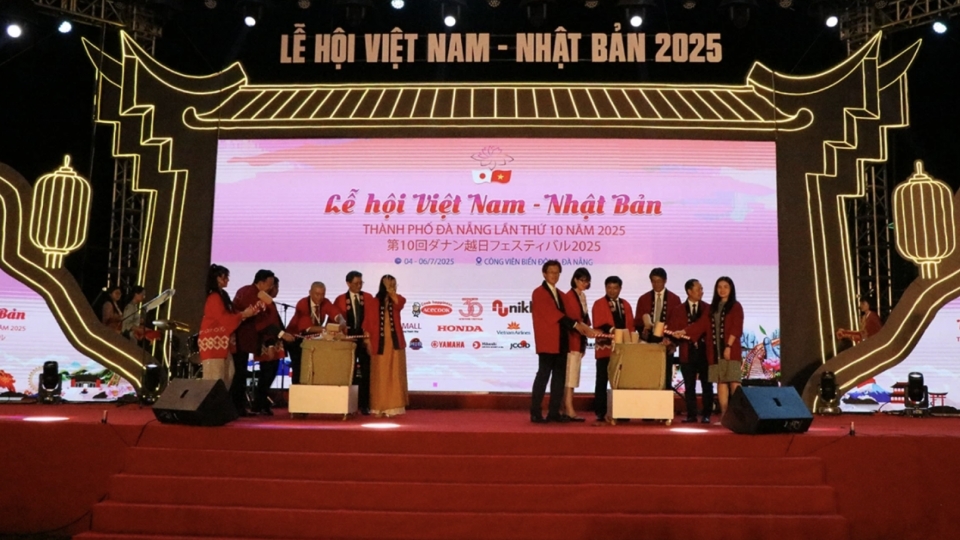Vietnam, Japan step up cooperation in cultural industry development
VOV.VN - Vietnam and Japan are stepping up cooperation in developing cultural industries, viewing culture as both a spiritual foundation and a strategic driver for sustainable development.

The Vietnam Federation of UNESCO Associations on October 17 held an international seminar in Tokyo on Cultural industries – a strategic driver for sustainable development.
Those in attendance at the event included Professor Yuji Suzuki, President of the National Federation of UNESCO Associations in Japan and Secretary-General of the Asia-Pacific Federation of UNESCO Clubs and Associations (AFUCA); Nguyen Le Hang, Deputy Secretary-General of the Vietnam Federation of UNESCO Associations and Deputy Editor-in-Chief of Ngay Nay magazine; along with speakers, scholars, business representatives and members of the Vietnamese community in Japan.
In her opening remarks, Nguyen Le Hang affirmed that the seminar extended a shared journey of trust and responsibility between the UNESCO Associations of Vietnam and Japan, who have long worked together to promote UNESCO’s values.
She noted that in Vietnam, the notion that “culture is the spiritual foundation of society, both the goal and the driving force of development” has been affirmed through national cultural and social strategies. The Tokyo seminar, she said, continued this spirit within the broader flow of international cooperation, reflecting the sustained efforts of the two UNESCO federations.
She added that the chosen theme “Cultural industries -a strategic driver for sustainable development”, illustrates the shared vision and harmony between the two organizations. Japan, with its advanced creative industry, and Vietnam, with its rich cultural heritage undergoing digital transformation, can learn valuable lessons from each other on preserving identity while fostering creativity and innovation.
Hang expressed her belief that, in the spirit of solidarity and international cooperation, the friendship between the Vietnam Federation of UNESCO Associations and its Japanese counterpart will continue to thrive as a model of partnership within the global UNESCO movement.
Speaking to the press, Professor Yuji Suzuki emphasized that culture, in its broadest sense, shows a way of life shaped by human behavior and thinking. From that perspective, culture is rooted in human experience and varies across regions, peoples, and religions.
He underlined that the foremost priority is the proper preservation of social and cultural heritage. While Japan and Vietnam have different historical paths, both attach great importance to valuing local communities and passing cultural traditions on to future generations.
According to him, Japan places strong emphasis on cultural education, starting from the primary level. This approach is based on the idea that national culture is the sum of local cultures rather than the elimination of regional distinctions to form a single national identity.
Suzuki stressed that the distinctive cultures of both Japan and Vietnam should be seen as shared assets of humanity. Many of their cultural heritages have been recognized by UNESCO as World Heritage sites. Enhancing awareness of Vietnamese culture and Japan’s local cultures, he said, is a highly meaningful cultural initiative.
Director Nguyen Huy Quang, representing Van Show Art Joint Stock Company, cited large-scale art productions in Vietnam over the past decade as examples of how cultural industries contribute to economic growth. Many of these shows have enjoyed lifespans of five to eight years, becoming major tourism attractions, particularly for international visitors, while spreading the value of Vietnamese cultural identity. He noted that cultural-based art performances have helped build a sustainable ecosystem that generates economic benefits for localities.
Quang expressed hope that the UNESCO federations of Vietnam and Japan will continue to support the development of cultural and performing arts industries, providing more opportunities for cultural exchange and trade promotion, as well as for learning from Japan’s success in preserving identity and promoting cultural values.
The seminar featured two discussion sessions with speakers, including directors, artists, and entrepreneurs from both countries, as well as representatives of the Vietnamese community in Japan.
The sessions were lively and substantive, generating ideas to bolster cooperation in cultural industries and share visions for future collaboration. From insightful presentations and practical experience to artistic performances and tributes to artists and artisans, the event conveyed one clear message: culture is not only a spiritual heritage but also a strategic driver for sustainable development.



